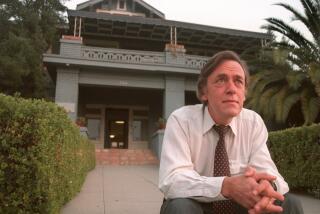Trading In the Halls of Justice for Halls of Ivy
- Share via
Fourteen years after graduating with honors from Harvard Law School, Ralph Mitzenmacher walked out on a successful legal career in Los Angeles to begin a scholarly life that promises neither professional nor financial rewards.
Lee Ann Meyer did the same. A UCLA graduate, Meyer was a specialist in public interest law who left her job as litigation associate with a Los Angeles firm.
Both enrolled at Claremont Graduate School in September and after four or five years of hard work for doctoral degrees, and with some luck, they may become history teachers earning a fraction of their former incomes.
“It was easy,” Mitzenmacher said of his sudden decision to drop what he had thought was his life’s work. “I just woke up in the middle of one night and said to myself, ‘I want to read and write and study.’ And a light clicked on.”
Meyer laughed. “I was sitting at my desk when the same thing happened.”
It was not really that easy, both admitted.
Bar associations and law schools have no records of how many lawyers change careers, but Ted Hulbert, spokesman for UCLA School of Law, said, “It usually works the other way. A lot of people fulfill their life’s dream by going to law school. We don’t hear much about successful lawyers leaving just for personal development.”
Mitzenmacher and Meyer, strangers who met in September on registration day at Claremont, both said they left their Los Angeles law firms for what they called self-fulfillment--a reason many of their colleagues found baffling.
Mitzenmacher, 39, who grew up in the San Fernando Valley, said he had been committed to social reform in the 1960s when he attended Brandeis University, believing “that lawyers played an important role.”
After graduating magna cum laude from Harvard Law School, he worked for several law firms. The notion of being a historian first occurred in 1980, he said, “and it took that many years to make the decision to stop living my life for the problems of other people and start focusing on myself.”
Meyer, 30, who grew up in Irvine, was an honors graduate in political science at UC Berkeley and in law at UCLA. She said she first dreamed of being an American studies teacher about 1981 “and it just clicked then. But I put it on the back burner because I wanted to save the world in public interest law.”
Now she calls fulfilling her dream a “$100,000 decision”--the salary she is losing and the cost of graduate school. “It will be more,” she said. “Financially, it’s unbelievable.”
Leonard Levy, Pulitzer Prize-winning historian, authority on the U. S. Constitution and chairman of the history faculty at Claremont Graduate School, was central to their decisions.
Mitzenmacher remembers Levy as an inspiring professor when they both were at Brandeis and as being influential in his decision to become a lawyer. Meyer said Levy heads “the only American studies program in the area that was of high enough caliber to interest me.”
As Claremont applicants, both were interviewed by a skeptical Levy, who chooses the history students.
“I thought it was my job to dissuade them,” he said. “I informed them of the pitfalls, the humiliation of being students, competing with people just graduated from college.
“But the interesting thing about those two, to me, was their determination,” Levy said. “They said, ‘I’ve tried, I’ve done it and that’s not the way I want to spend the rest of my life.’ I welcome older students who know what they want to be when they grow up, as opposed to younger ones who don’t. These are exceptions, and I hope I get more of them.”
Can Be Discouraging
Levy said doctoral programs can be discouraging for successful professional people “because it takes so long, is so very difficult, and the dissertation is like a book. And the chance of good academic jobs is pretty slight. The academic market has been very poor. Lawyers have a good chance of going back to a lucrative career.”
Meyer, who is single and lives in Upland, said, “I was at a terrific law firm, constantly jumping into new areas and always on the learning curve, finding new things. I would get something really exciting--a water pollution case, copyright, discrimination, et cetera--but it wasn’t up to me what I could do with those. Eventually I found my life was controlled by my clients’ concerns, the judges’ rules, the courts’ rules.
“Now I have some control. Now the trick is to make what you’re doing meaningful, to contribute. Finding a way to do that has been an overwhelming task. There’s so much to learn.”
Mitzenmacher, whose wife of 17 years, Deborah, is a lawyer, has two children under age 3. They live in Hollywood and he commutes to the Claremont campus.
14 Years Was Enough
“The practice can be so consuming if you do it well,” he said. “It can be grinding. My feeling was that 14 years was enough.
“I became a father at 36,” he said. “You ask, how much time do you want to have to be with your children? The whole emphasis on education became much more important when those little boys came along. That’s a real important issue.”
Both former lawyers experienced what they called “a wistfulness” on the part of some of their colleagues.
“There was a strange kind of envy” when she told other lawyers of her intentions last summer, Meyer said. “For some, I touched a nerve on their decision to be a lawyer and they reacted defensively. And then there were those who thought I was crazy.”
Mitzenmacher said, “Among my clients, there was an absolute sense of disbelief, mostly focusing on the economics of the situation. There were some who thought I was a little off the wall. But there was also this wistfulness--people who told me how much better their lives would have been if they had done what they really wanted.
‘No Guarantees’
“Sure, I have anxiety--there are no guarantees that I’ll ever have any success as a historian or teacher,” Mitzenmacher said. “But what’s the worst thing that can happen? I’ll have to go back and practice law, and that’s not so bad. And meanwhile, I’ll have done what I wanted and they can’t take that away from me.”
Meyer said, “I have panic attacks over concerns with money. But when I was making all that money, it didn’t make me very satisfied--buying all the toys you want and finding that’s not going to do it for you. I have to remind myself as I go through these panic attacks that nothing is keeping me here. If it doesn’t work, I’ll have a hefty bill, but I’ll have done what I wanted.”
More to Read
Sign up for Essential California
The most important California stories and recommendations in your inbox every morning.
You may occasionally receive promotional content from the Los Angeles Times.










